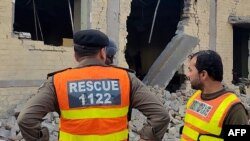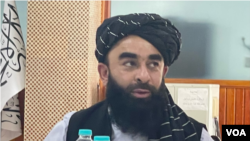Pakistan urged Afghanistan’s Taliban government Thursday to take decisive action against “terrorist entities” on its soil and extradite fugitive militant leaders allegedly responsible for plotting this week’s deadly assault on a Pakistani military base.
“We have noted the statement by the Afghan interim government that it will investigate the terrorist attack of December 12,” Foreign Ministry spokesperson Mumtaz Baloch told a weekly news conference in Islamabad.
Tuesday’s gun-and-suicide bomb attack, one of the deadliest in Pakistan’s recent history, occurred in the militancy-hit northwestern district of Dera Ismail Khan, killing 23 soldiers and wounding many more.
Multiple security sources reported an Afghan suicide bomber was among a group of six assailants who raided the military base camp and were killed in the ensuing clashes with Pakistani security forces.
A recently emerged militant outfit, the Tehreek-e-Jihad Pakistan, or TJP, claimed the attack. Baloch said TJP was “affiliated” with the Tehrik-i-Taliban Pakistan, or TTP, which is a globally designated terrorist group and is waging war against the Pakistani state out of sanctuaries on Afghan soil.
“Afghanistan must take strong action against perpetrators of this heinous attack and hand them over to Pakistan along with the TTP leadership in Afghanistan,” she said. “We also expect Afghanistan to take concrete and verifiable steps to prevent the use of Afghan soil by terrorist entities against Pakistan.”
Taliban spokesman Zabihullah Mujahid told Afghan state television on Wednesday that “if they [Pakistan] ask for an investigation and share details with us, we will surely investigate it.” He, however, rejected as groundless Islamabad's allegations that the assault was connected to Afghanistan.
Pakistan remains skeptical about the Taliban’s claims of not allowing terrorist groups to threaten neighboring countries from Afghan soil. Mujahid did not condemn the attack nor have the Taliban done so previously, prompting Islamabad to demand they publicly denounce such acts of terrorism.
Officials in Islamabad maintain several thousand TTP leaders and fighters have enjoyed “greater operational freedom” in Afghanistan since the Taliban returned to power two years ago, leading to a 65% surge in terrorist attacks in Pakistan and killing nearly 2,500 people, including security forces.
Authorities say fighters and suicide bombers linked to the ruling Taliban in Afghanistan have also participated in some of the high-profile attacks this year, leading to a 500% rise in suicide bombings in Pakistan since early 2023.
Pakistan's army chief, General Asim Munir, is in the United States discussing with U.S. counterparts, among other issues, the growing threat of terrorism facing his country from militant sanctuaries in Afghanistan.
Without going into specifics of the talks, U.S. State Department spokesman Mathew Miller told reporters on Wednesday that Washington looks forward to cooperating with Islamabad on regional security and defense.
“We have taken a number of steps to partner with them this year on antiterrorism activities. In March, the United States and Pakistan held a high-level counterterrorism dialogue to discuss the shared terrorist threats facing our two countries and to develop strategies to cooperate in critical areas, such as border security and countering the financing of terrorism,” Miller said without elaborating.
He added that the U.S. is funding several counterterrorism capacity-building programs in Pakistan focused on law enforcement and justice.
Pakistan was among only three countries that formally recognized the previous Taliban government in Kabul from 1996 to 2001 before they were ousted by a U.S.-led international military intervention for sheltering the al-Qaida terrorist network. The others were Saudi Arabia and the United Arab Emirates.
The Pakistani military stood accused of providing shelter and covert support to the Taliban insurgency for two decades followed their defeat by foreign-backed forces in 2001.
But Islamabad’s relations with the Taliban have worsened since they retook control of Afghanistan in August 2021, when all U.S. and NATO troops withdrew from Afghanistan — mainly over growing terrorism in Pakistan.
TTP is also known as an offshoot and close ally of the Afghan Taliban. It provided recruits and shelter on Pakistani soil to Taliban leaders as they directed insurgent attacks against international forces on the Afghan side of the border.
An article published recently in the mainstream Afghan TOLO media outlet quoted Taliban officials as acknowledging that TTP is a close ally of de facto Kabul rulers. It went on to claim that in recent talks between Kabul and Islamabad, the Pakistani side demanded action against TTP militants, but the Taliban refused.
“The Pakistani authorities wanted the Afghan government to take action against the TTP, stop them from operating, arrest them, imprison them, and hand them over to Pakistan,” the author quoted an unnamed Taliban official who attended the meeting.
“These requests were not accepted by the Afghan side because, on the one hand, TTP has helped them against NATO and the United States of America in the past years, and on the other hand, these actions are against their [Taliban] values.”





